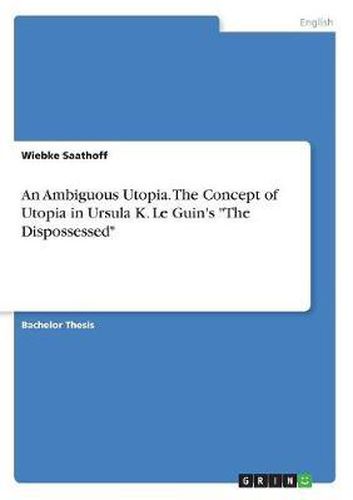Readings Newsletter
Become a Readings Member to make your shopping experience even easier.
Sign in or sign up for free!
You’re not far away from qualifying for FREE standard shipping within Australia
You’ve qualified for FREE standard shipping within Australia
The cart is loading…






Bachelor Thesis from the year 2015 in the subject English Language and Literature Studies - Literature, grade: 1,3, University of Hannover, language: English, abstract: Ursula K. Le Guin’s The Dispossessed: An Ambiguous Utopia is a science fiction novel from 1974, often conceived as a blueprint for an anarchist society. The Dispossessed presents the reader a juxtaposition of Anarres and its sister planet Urras which houses a society based on capitalism. The aim of the present paper is to explore the location of utopia in The Dispossessed. Is it a utopia as ambiguous as its subtitle declares? The paper argues that Le Guin’s novel in many respects coincides with the concept of a critical utopia. Whereas it is true that both Urras and Anarres display many features that could be considered utopian, The Dispossessed equally presents the flaws of its society which, as this paper suggests, relativises their status as the ideal place. The second part of the paper reflects upon the circumstance that both planets are introduced to the reader in the course of a dual narrative, which presents the plotline in alternating chapters on Urras and Anarres. It examines the narrative focus on the protagonist Shevek and his experience of the societies in the light of Tom Moylan’s and Ernst Bloch’s concepts of utopia. The paper concludes that this ambiguous mode of narration, switching in time and place, firstly portrays a concept of utopia which is dynamic and embedded in historicity and secondly expresses the importance of individual action and initiative for the realisation of utopia.
$9.00 standard shipping within Australia
FREE standard shipping within Australia for orders over $100.00
Express & International shipping calculated at checkout
Stock availability can be subject to change without notice. We recommend calling the shop or contacting our online team to check availability of low stock items. Please see our Shopping Online page for more details.
Bachelor Thesis from the year 2015 in the subject English Language and Literature Studies - Literature, grade: 1,3, University of Hannover, language: English, abstract: Ursula K. Le Guin’s The Dispossessed: An Ambiguous Utopia is a science fiction novel from 1974, often conceived as a blueprint for an anarchist society. The Dispossessed presents the reader a juxtaposition of Anarres and its sister planet Urras which houses a society based on capitalism. The aim of the present paper is to explore the location of utopia in The Dispossessed. Is it a utopia as ambiguous as its subtitle declares? The paper argues that Le Guin’s novel in many respects coincides with the concept of a critical utopia. Whereas it is true that both Urras and Anarres display many features that could be considered utopian, The Dispossessed equally presents the flaws of its society which, as this paper suggests, relativises their status as the ideal place. The second part of the paper reflects upon the circumstance that both planets are introduced to the reader in the course of a dual narrative, which presents the plotline in alternating chapters on Urras and Anarres. It examines the narrative focus on the protagonist Shevek and his experience of the societies in the light of Tom Moylan’s and Ernst Bloch’s concepts of utopia. The paper concludes that this ambiguous mode of narration, switching in time and place, firstly portrays a concept of utopia which is dynamic and embedded in historicity and secondly expresses the importance of individual action and initiative for the realisation of utopia.